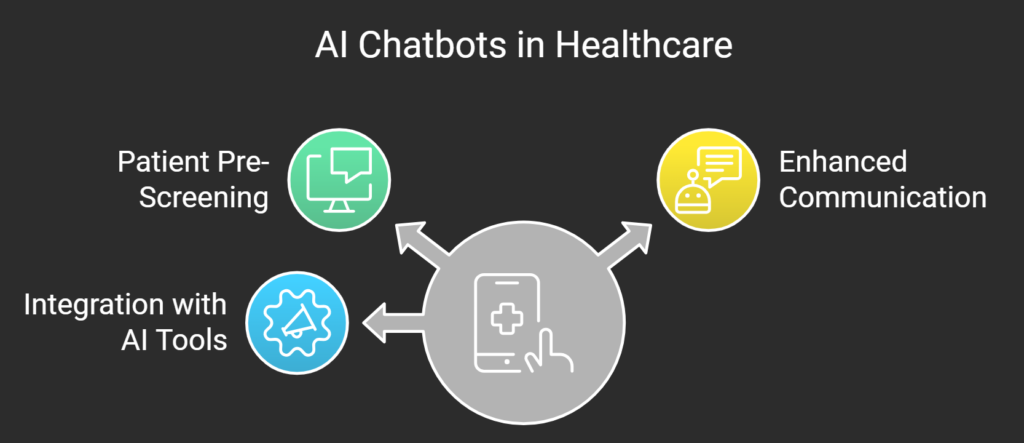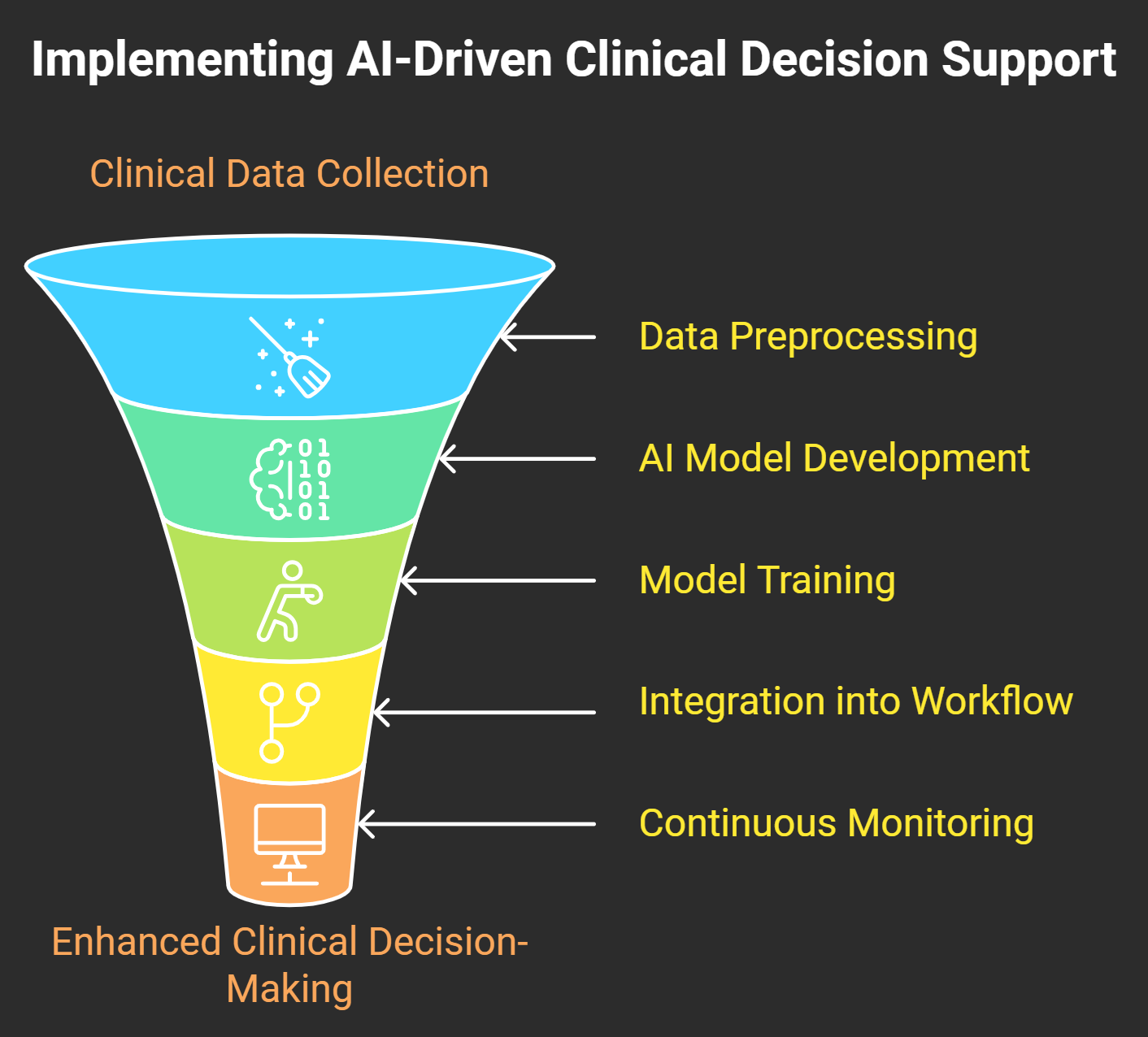AI-driven decision support systems are revolutionizing healthcare by enabling faster, more accurate, and efficient clinical diagnoses. By leveraging artificial intelligence (AI), healthcare professionals can access advanced diagnostic tools, optimize workflows, and ultimately improve patient outcomes. This blog explores the steps to implement AI-powered diagnostic support in healthcare settings, delves into its benefits, and highlights its role in reshaping modern medicine.
Understanding AI-Driven Decision Support in Clinical Diagnoses
AI decision support systems utilize machine learning algorithms, natural language processing, and other intelligent technologies to assist clinicians in diagnosing and managing patient conditions. These tools analyze vast amounts of clinical data, including medical records, diagnostic imaging, and lab results, to provide evidence-based recommendations. They play a critical role in modern medicine, addressing challenges like diagnostic errors, increasing workloads, and the complexity of analyzing diverse medical data.
Benefits of AI Decision Support Systems in Healthcare
- Enhanced Accuracy: By analyzing large datasets, AI systems reduce the likelihood of diagnostic errors, ensuring that patients receive timely and precise care.
- Faster Diagnoses: AI-powered tools automate the analysis of medical data, allowing clinicians to focus on treatment planning rather than time-intensive manual reviews.
- Improved Patient Outcomes: With accurate insights, healthcare providers can make informed decisions that improve patient recovery rates.
- Streamlined Operations: These tools integrate seamlessly with existing hospital management systems, reducing redundancies and optimizing workflows.
Example: Research by Nature Medicine indicates that AI diagnostic tools have matched or outperformed human clinicians in identifying certain diseases, such as diabetic retinopathy, with over 90% accuracy.
Steps to Implement AI Decision Support in Clinical Diagnoses
Step 1: Assess the Current Infrastructure
Before adopting AI-driven decision support tools, healthcare providers must evaluate their existing systems, including hospital management systems, patient record databases, and diagnostic workflows. Understanding current capabilities helps identify gaps where AI can add value.
- Integration with Existing Systems: Effective implementation requires compatibility with hospital management systems to streamline data exchange and workflow management.
- Understanding Clinical Needs: Conduct surveys and interviews with clinicians to determine the specific challenges AI tools should address.
Step 2: Select the Right AI Tools
Choosing AI diagnostic tools tailored to your organization’s needs is essential. For instance, some tools specialize in analyzing imaging data, while others excel in natural language processing for electronic health records.
- Vendor Evaluation: Compare AI solutions based on features, scalability, and user-friendliness.
- Data Compatibility: Ensure the AI tool can work with your existing data formats and clinical systems.
Step 3: Train Healthcare Professionals
For successful implementation, healthcare staff must be trained to use AI systems effectively. Training ensures that clinicians understand how to interpret AI-generated recommendations and integrate them into patient care.
- Onboarding Sessions: Provide workshops and hands-on training for medical staff.
- Continuous Support: Offer ongoing support to address queries and adapt to evolving AI capabilities.
Step 4: Ensure Seamless Integration
AI-driven decision support tools must integrate smoothly with automation in healthcare workflows. This includes synchronizing the tools with hospital management systems to automate data entry, analysis, and reporting.
- API Compatibility: Use tools with robust APIs for seamless integration.
- Workflow Alignment: Adjust clinical workflows to incorporate AI recommendations naturally.
Step 5: Monitor and Optimize
Continuous monitoring ensures that AI tools deliver consistent and reliable results. Periodic evaluations and updates can address any issues and improve performance.
- Performance Metrics: Track accuracy, efficiency, and user satisfaction.
- Feedback Loops: Gather input from healthcare staff to refine system functionality.
AI Chatbots in Healthcare and Decision Support Systems

AI chatbots in healthcare are an essential component of decision support systems, offering significant benefits such as patient engagement, data collection, and preliminary diagnosis. These chatbots interact with patients, gather symptoms, and provide clinicians with structured data for further analysis.
Role of AI Chatbots in Healthcare
- Patient Pre-Screening: Chatbots gather information about symptoms, saving clinicians valuable time.
- Enhanced Communication: They facilitate better communication between patients and healthcare providers, improving the overall patient experience.
- Integration with AI Tools: AI chatbots work alongside decision support systems, providing real-time data that enhances diagnostic accuracy.
For example, during the COVID-19 pandemic, many hospitals used AI chatbots to triage patients, enabling quicker responses and reducing the burden on frontline workers.
Overcoming Challenges in Implementing AI Decision Support
Implementing AI decision support systems comes with its challenges. Addressing these proactively ensures smooth adoption and sustained success.
Data Privacy and Security
AI tools process sensitive patient data, making robust data protection measures essential. Implement encryption and comply with regulations like HIPAA to safeguard patient information.
Resistance to Change
Some healthcare professionals may resist adopting AI tools due to unfamiliarity or concerns about accuracy. Providing clear evidence of AI’s benefits and offering comprehensive training can alleviate these concerns.
Cost Considerations
AI solutions often require significant upfront investment. However, the long-term savings from improved efficiency and reduced errors justify the costs.
Statistical Insight: A report by Deloitte indicates that healthcare providers who implement AI tools see an average ROI increase of 15-20% within the first three years.
Automation in Healthcare: The Role of AI in Streamlining Processes
Automation in healthcare goes beyond clinical diagnoses, encompassing administrative tasks, patient management, and treatment planning. AI systems automate repetitive processes, allowing healthcare providers to focus on delivering quality care.
Examples of Automation in Healthcare
- Patient Data Management: AI automates the organization and analysis of patient records, ensuring accurate and up-to-date information.
- Scheduling and Appointments: Automated systems streamline appointment bookings, reducing administrative workloads.
- Hospital Management Systems: Integration with hospital management systems enhances efficiency by automating billing, inventory management, and resource allocation.
Automation not only improves operational efficiency but also enhances patient satisfaction by minimizing delays and errors.
Benefits of Using AI for Clinical Decision-Making
AI is transforming clinical decision-making by providing evidence-based insights, improving diagnostic precision, and streamlining workflows.
- Personalized Care Plans: AI considers patient-specific factors, tailoring treatment recommendations to individual needs.
- Early Disease Detection: Advanced algorithms detect patterns in medical data that might be overlooked by human clinicians.
- Scalable Solutions: AI tools adapt to healthcare organizations of all sizes, from small clinics to large hospitals.
Example: IBM Watson Health has demonstrated success in oncology by offering treatment recommendations based on patient data and global research insights.
Conclusion
AI-driven decision support systems are transforming clinical diagnoses by offering unparalleled accuracy, efficiency, and personalization. These tools, when integrated with hospital management system and AI chatbots in healthcare, streamline workflows and enhance patient care. Automation in healthcare is no longer a futuristic concept; it’s a reality driving operational excellence and better health outcomes.
Healthcare providers must embrace these technologies to remain competitive, meet patient expectations, and improve clinical outcomes. By following the steps outlined above, healthcare organizations can implement AI decision support systems effectively and unlock their full potential.
FAQs
1. How do AI decision support systems improve clinical diagnoses?
AI systems analyze patient data, identify patterns, and provide evidence-based recommendations, ensuring faster and more accurate diagnoses.
2. Can AI tools integrate with hospital management systems?
Yes, AI tools are designed to integrate seamlessly with hospital management systems, enhancing data management and workflow efficiency.
3. Are AI chatbots in healthcare secure?
AI chatbots comply with data privacy regulations like HIPAA, ensuring that patient information remains confidential and secure.
4. What challenges might organizations face when adopting AI in healthcare?
Challenges include high implementation costs, data security concerns, and resistance from healthcare professionals unfamiliar with AI technology.
5. How does automation in healthcare benefit hospitals and clinics?
Automation in healthcare reduces administrative burdens, improves patient experiences, and enhances overall operational efficiency.
6. Can AI decision support systems handle complex diagnoses?
Yes, AI systems are capable of analyzing complex medical data and providing insights for challenging cases, such as rare diseases or multi-factorial conditions.
